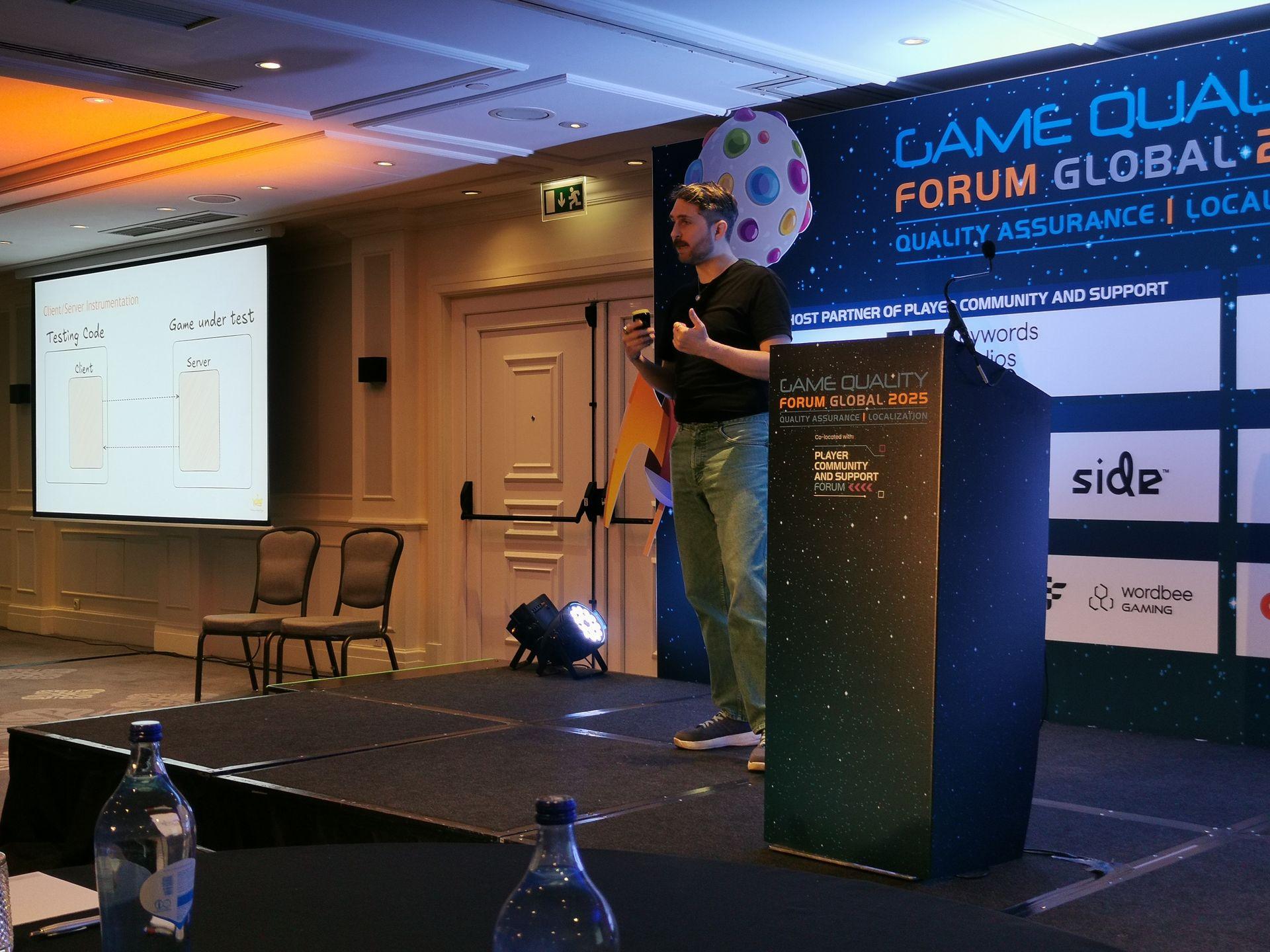This year I was lucky to attend the Game Quality Forum as a speaker. This time the conference took place in Lisbon, and after a few weeks it’s time to write my report.
Three days in total, it was packed with talks split in 3 main tracks: QA, Localisation, and Player Community and Support.
TL;DR
- While I was glad to see familiar faces, it was clear some couldn’t attend due to tighter budgets this year.
- I spoke on a panel about maintaining quality in legacy systems, and gave a talk on building the first vertical slice of test automation in a game team. It was encouraging to see the audience nodding along. Several teams could relate to what I was saying.
- Automation is becoming a major theme, which is a noticeable change compared to two years ago.
- Many exhibitors and speakers showcased their own AI solutions and experiments. The fact it’s a bit all over the place without a strong focus in one direction tells me we’re still in the early stages of AI for game development.
- The Game Quality Forum remains an important event for me, as it sits right at the intersection of everything I do (quality, game development, automation). Conversations with my peers showed we share similar challenges, which is super valuable. On top of that, the conference organization was top notch!👍
My talk: Test automation, the first vertical slice

My talk covered 3 angles: the tech, the people, and a blueprint to get started with test automation.
I explained the 2 archetypes when it comes to test automation tools for video games: client/server instrumentation and embedded runner. I also explained why this matters, namely because the structure of your team will determine if a tool is a better fit for you or not.
I also listed what tools were available to pick up right away.
Then I covered what kind of people you might want to hire to write the first tests. I encouraged teams to make compromises instead of looking for unicorns because it's unlikely they'll found someone with the perfect profile.
Finally I showed a micro roadmap showing the steps to undertake to get started. It tackled the very beginning up to collaborating with the feature engineers in an effort to shift left.
I had very good feedback from people looking to get started as well as people who already walked the walk. This is encouraging to see that my own experience can be helpful to others.
Panel: Legacy Systems and Ensuring High Quality
I had the chance to take part in a panel on QA for legacy systems. I was on stage with 2 QA engineers from Nordeus. We all shared our experience with live games running for more than a decade each.
During the panel we covered a few things worth repeating here:
- Cover your basics. Build confidence with your team before you can move faster. This means having a strong CI/CD pipeline, critical paths being tested etc. It’s okay to start with manual testing first and then ramp up automation once this is familiar for everyone.
- A live game running for a long time is by definition a successful game. A successful game is worth automating because it has proven its capability of capturing revenue, so it is worth investing in it.
- Test automation tools for video games are quite young and your system might not be compatible with these tools. So you’ll often have to write your own tools
- On the other hand proprietary tools have a higher friction when it comes to hiring people or learning them, sometimes it can be a factor in choosing off-the-shelf tech for new projects
Are we automated yet?
Two years ago the majority of people I met at the conference hardly had any exposure to test automation. This year test automation was part of many talks but also conversations among people, so it seems everyone is at least aware of it inside their team.
I also had several discussions with people who got started but weren’t sure if they were on the right track. That’s where my talk was useful to them.
All of this is encouraging. To some degree all the buzz around AI is helping a bit because it is often marketed as an automation solution.
The big push for AI
There were multiple exhibitors and multiple talks about AI during the conference. While I’m not surprised, I noticed a lot of what is promised tends to cover multiple areas at once. Sometimes it’s about testing, sometimes it’s about generating content, sometimes it’s about localization. Some companies offer all of that at once!
The fact it’s a bit all over the place, tells me companies are trying to throw stuff at the wall to see what sticks. So far I didn’t see any pitch that blew my mind.
QA career paths
Career paths have been another big topic this year. Game QA is going through a challenging time, under pressure from multiple directions: budget cuts, lofty promises around AI, and a general lack of recognition for its value.
As QA professionals, we’re looking for reassurance that our work matters (and it absolutely does!).
I really believe automation can open up new opportunities in the QA field. But, like QA as a whole, it often suffers from being undervalued and under-resourced.
Conclusion
When it comes to organization, the conference went very smoothly, especially as a speaker. Another plus for me was the food: there was no shortage which is a common occurrence in such conferences, particularly if you don’t follow everyone’s rhythm. Not only was there enough but you had options for meat eaters, vegetarians, and vegans.
If you’re working in game QA, especially when it comes to test automation, the Game Quality Forum is a key conference. Even when it comes to my own niche topic, I had very fruitful discussions with people there. So I recommend it more than ever.
